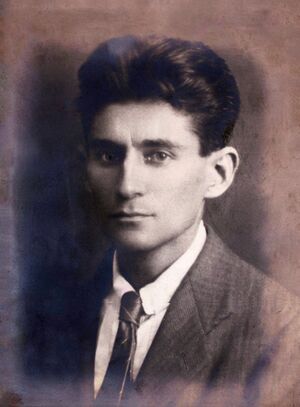Franz Kafka
(author) | |
|---|---|
 | |
| Born | 3 July 1883 Prague, Bohemia, Austria-Hungary (Now Czech Republic) |
| Died | 3 June 1924 (Age 40) Kierling, part of, Klosterneuburg, Lower Austria, Austria |
| Citizenship | Austria, Czechoslovakia |
| Alma mater | German Charles-Ferdinand University |
| Parents | • Hermann Kafka • Julie Kafka |
“Someone must have slandered Josef K., for one morning, without having done anything truly wrong, he was arrested.” ― Franz Kafka, The Trial | |
Franz Kafka was a German-speaking Bohemian novelist and short-story writer, widely regarded as one of the major figures of 20th-century literature. His work fuses elements of tealism and the fantastic. It typically features isolated protagonists facing bizarre or surrealistic predicaments and incomprehensible socio-bureaucratic powers.
The Trial is a novel written between 1914 and 1915 and published posthumously on 26 April 1925. One of his best-known works, it tells the story of Josef K., a man arrested and prosecuted by a remote, inaccessible authority, with the nature of his crime revealed neither to him nor to the reader. Heavily influenced by Dostoevsky's Crime and Punishment and The Brothers Karamazov, Kafka even went so far as to call Dostoevsky a blood relative. Like Kafka's other novels, The Trial was never completed, although it does include a chapter which appears to bring the story to an intentionally abrupt ending.
The Castle is a 1926 posthumous novel. In it a protagonist known only as "K." arrives in a village and struggles to gain access to the mysterious authorities who govern it from a castle supposedly owned by Count Westwest. Kafka died before he could finish the work, but suggested it would end with K. dying in the village, the castle notifying him on his death bed that his "legal claim to live in the village was not valid, yet, taking certain auxiliary circumstances into account, he was permitted to live and work there." Dark and at times surreal, The Castle is often understood to be about alienation, unresponsive bureaucracy, the frustration of trying to conduct business with non-transparent, seemingly arbitrary controlling systems, and the futile pursuit of an unobtainable goal.
The Metamorphosis is a novella which was first published in 1915. One of Kafka's best-known works, The Metamorphosis tells the story of salesman Gregor Samsa who wakes one morning to find himself inexplicably transformed into a huge insect (German ungeheures Ungeziefer, literally "monstrous vermin"), subsequently struggling to adjust to this new condition. The novella has been widely discussed among literary critics, with differing interpretations being offered.
In the Penal Colony is a short story written in German in October 1914, revised in November 1918, and first published in October 1919. The story is set in an unnamed penal colony. Internal clues and the setting on an island suggest Octave Mirbeau's The Torture Garden as an influence. As in some of Kafka's other writings, the narrator in this story seems detached from, or perhaps numbed by, events that one would normally expect to be registered with horror. "In the Penal Colony" describes the last use of an elaborate torture and execution device that carves the sentence of the condemned prisoner on his skin before letting him die, all in the course of twelve hours. As the plot unfolds, the reader learns more and more about the machine, including its origin and original justification.